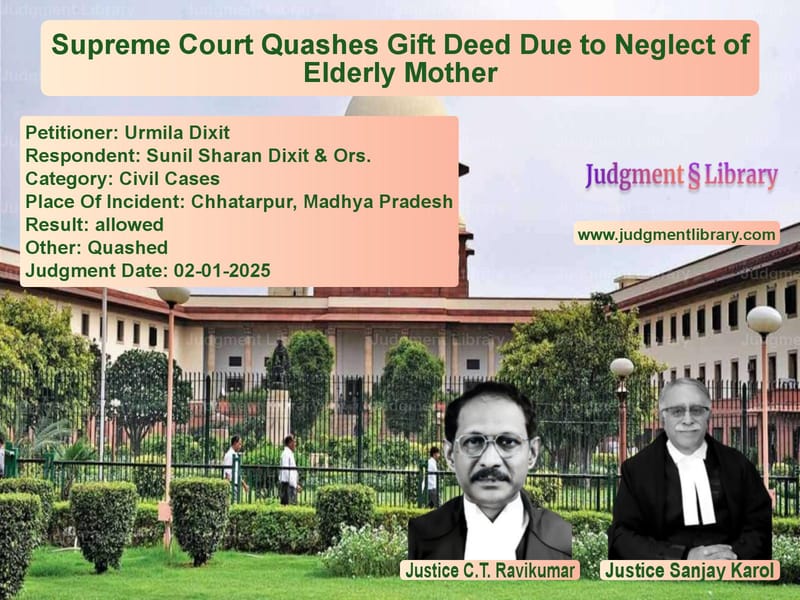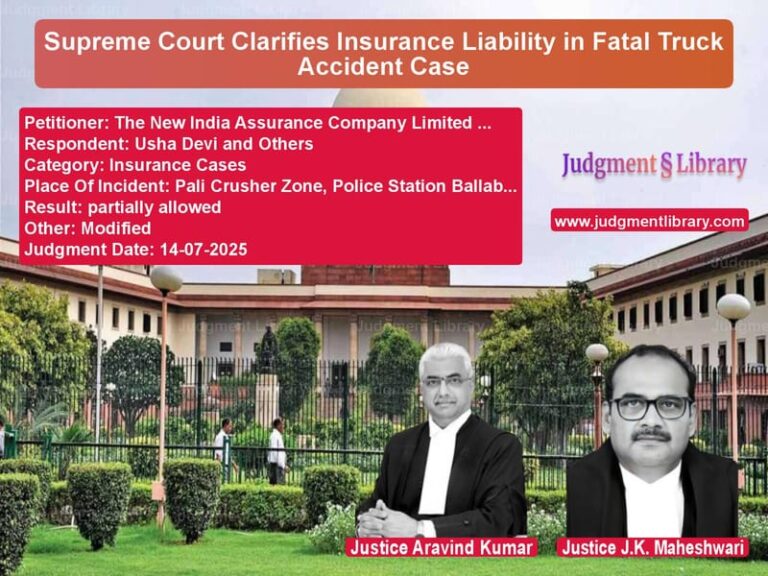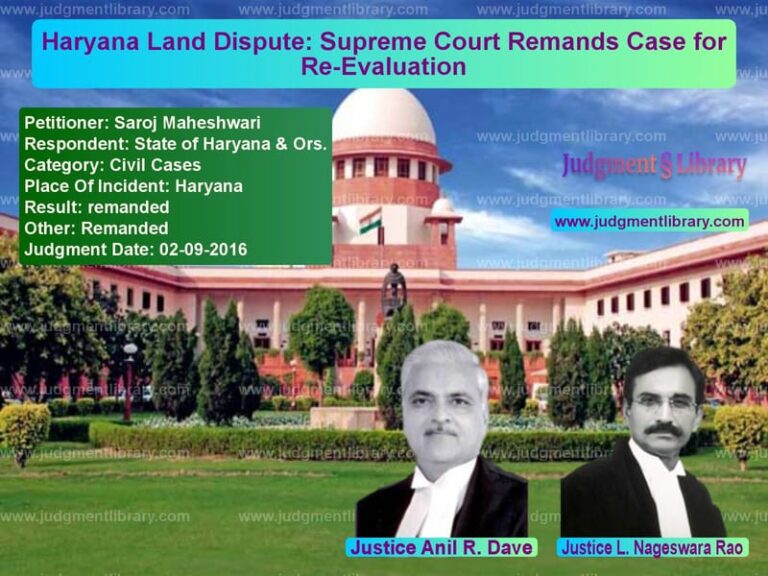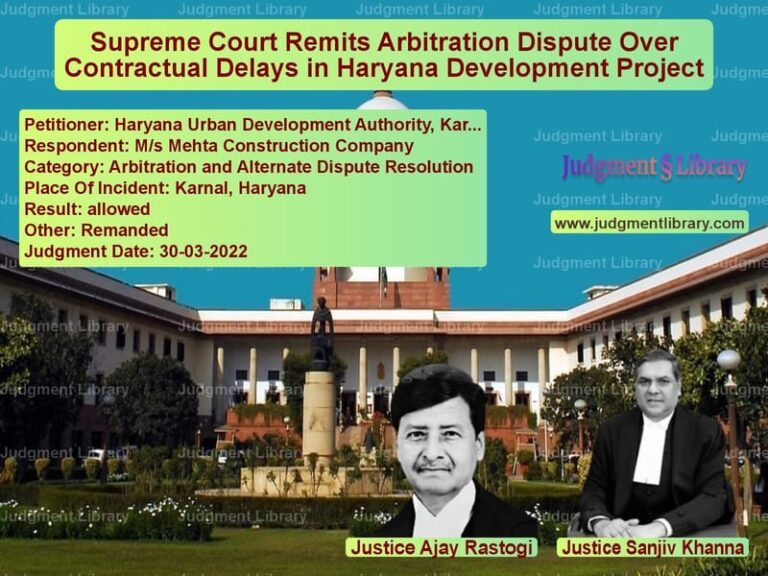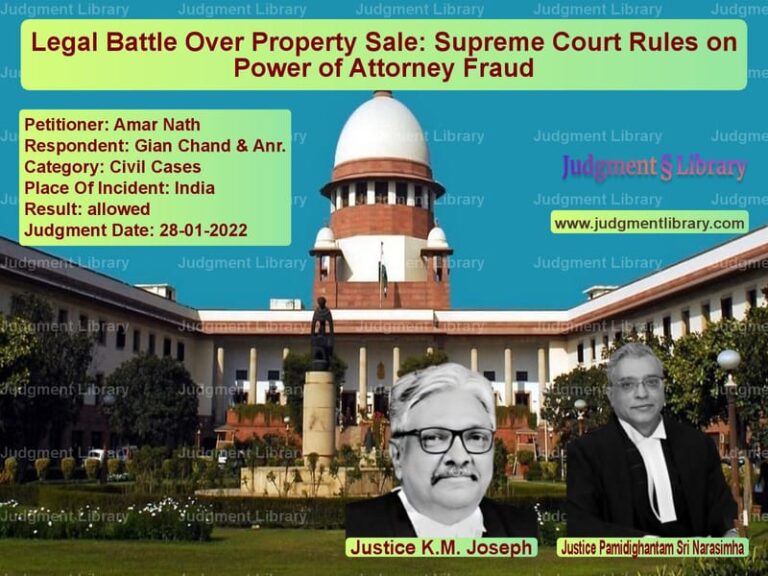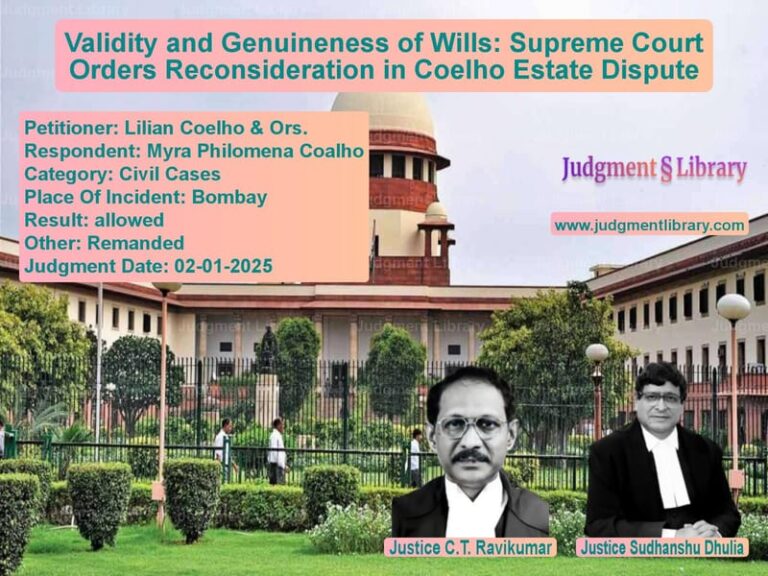Supreme Court Quashes Gift Deed Due to Neglect of Elderly Mother
The Supreme Court of India, in Urmila Dixit v. Sunil Sharan Dixit & Ors., ruled in favor of an elderly mother, quashing a property gift deed that had been executed in favor of her son. The Court upheld the applicability of Section 23 of the Maintenance and Welfare of Parents and Senior Citizens Act, 2007, reinforcing the protection of senior citizens from neglect and mistreatment.
Background of the Case
The appellant, Urmila Dixit, is an elderly mother who had transferred her property to her son, Sunil Sharan Dixit, through a gift deed dated September 9, 2019. The transfer was made with the understanding that the son would take care of his mother and provide for her basic needs. However, relations between them deteriorated, and the appellant alleged that she was being mistreated and not being provided proper care.
Key Facts
- The appellant had purchased the property in question on January 23, 1968.
- She executed a gift deed in favor of her son on September 7, 2019, which was registered on September 9, 2019.
- Along with the gift deed, a vachan patra (promissory note) was executed, wherein the son committed to taking care of his mother for the rest of her life.
- In December 2020, the appellant filed an application under Sections 22 and 23 of the 2007 Act, alleging mistreatment and neglect.
- The Sub-Divisional Magistrate, Chhatarpur, ruled in favor of the appellant, declaring the gift deed null and void.
- The son appealed the decision, but the Collector and Single Judge of the Madhya Pradesh High Court upheld the cancellation of the gift deed.
- The Division Bench of the High Court, however, set aside the previous orders and ruled in favor of the son.
- The appellant then moved the Supreme Court.
Legal Issues
Appellant’s Arguments
The appellant, Urmila Dixit, contended that:
- Her son had failed to uphold his commitment to care for her, violating the condition of the gift deed.
- Section 23 of the 2007 Act allows for the cancellation of transfers if the transferee fails to provide for the basic needs of the senior citizen.
- The High Court erred in setting aside the decisions of the lower courts.
- She had been subjected to harassment and had no means of sustenance without the property.
Respondent’s Arguments
The respondent, Sunil Sharan Dixit, argued that:
- The gift deed did not explicitly contain a maintenance condition.
- The vachan patra was allegedly fabricated and not part of the registered deed.
- The cancellation of the gift deed was arbitrary and should not have been upheld.
- The Tribunal did not have jurisdiction to order eviction.
Supreme Court’s Observations
1. Protection of Senior Citizens
The Court underscored the importance of protecting elderly citizens under the 2007 Act:
- “The Act is a beneficial legislation aimed at securing the rights of senior citizens.”
- “Traditional family structures are eroding, and legal safeguards are necessary to protect the elderly.”
2. Interpretation of Section 23
The Court emphasized that Section 23(1) of the Act applies even if the gift deed does not explicitly mention a maintenance clause:
- “If a senior citizen transfers property subject to an implied condition of maintenance, the transfer can be revoked if the obligation is not met.”
- “The vachan patra, though unregistered, reflected the intent of the parties and cannot be ignored.”
3. Jurisdiction of the Tribunal
The Court dismissed the contention that the Tribunal lacked the authority to order possession:
- “Tribunals under the Act can order eviction if necessary for the senior citizen’s welfare.”
- “This is in furtherance of the Act’s objectives and does not violate the rights of the transferee.”
Key Precedents Cited
- S. Vanitha v. Deputy Commissioner, Bengaluru Urban District: Recognized the power of tribunals under the Act to order eviction.
- Sudesh Chhikara v. Ramti Devi: Laid down the conditions for invoking Section 23 of the Act.
- Brahmpal v. National Insurance Company: Stressed the need for a purposive interpretation of beneficial legislation.
Final Judgment
- The Supreme Court set aside the High Court’s ruling and reinstated the order canceling the gift deed.
- The gift deed dated September 9, 2019, was declared null and void.
- Possession of the property was ordered to be restored to the appellant by February 28, 2025.
- The authorities were directed to ensure compliance with the order.
Implications of the Judgment
This ruling has significant implications:
- Strengthens protections for senior citizens against property transfers made under duress.
- Affirms that maintenance obligations do not need to be explicitly stated in a gift deed.
- Clarifies that tribunals under the 2007 Act have the authority to order eviction.
- Reinforces the principle that legal interpretations should favor the protection of vulnerable groups.
The judgment ensures that elderly citizens are not left destitute due to exploitation by family members and reinforces the legal framework for their protection.
Petitioner Name: Urmila Dixit.Respondent Name: Sunil Sharan Dixit & Ors..Judgment By: Justice C.T. Ravikumar, Justice Sanjay Karol.Place Of Incident: Chhatarpur, Madhya Pradesh.Judgment Date: 02-01-2025.
Don’t miss out on the full details! Download the complete judgment in PDF format below and gain valuable insights instantly!
Download Judgment: urmila-dixit-vs-sunil-sharan-dixit-&-supreme-court-of-india-judgment-dated-02-01-2025.pdf
Directly Download Judgment: Directly download this Judgment
See all petitions in Property Disputes
See all petitions in Succession and Wills
See all petitions in Specific Performance
See all petitions in Judgment by C.T. Ravikumar
See all petitions in Judgment by Sanjay Karol
See all petitions in allowed
See all petitions in Quashed
See all petitions in supreme court of India judgments January 2025
See all petitions in 2025 judgments
See all posts in Civil Cases Category
See all allowed petitions in Civil Cases Category
See all Dismissed petitions in Civil Cases Category
See all partially allowed petitions in Civil Cases Category

